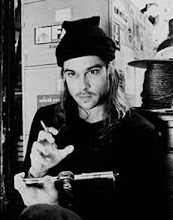
The only reason Jefferson Jones still listens to the Rush Porcine Show (on the Excellence in Radio Network) is to keep tabs. He keeps tabs on Rush because he’s sure Rush keeps tabs on him, like he keeps tabs on the most obscure of liberal senators; of course, Rush can hire tab-keepers to keep tabs, maybe even interns in tabulatory grad school who will surf for Jefferson Jones and tab Jefferson Jones should Rush need to take Jefferson Jones on in a media-hosted war of words again. Despite the resource gap, Jones fights on for his tabs. And he keeps them.
“Come on, people,” the bombastic radio-show host urges, “isn’t it obvious that every single person in this administration is Peter Principled? Do we really need more America bashing from this administration...”
No, Jones doesn’t really believe that fantasy; fifteen years after he’d gained his modicum of literary fame by fictionalizing Rush, Jones’ paranoia gland has neither the energy nor strength remaining to imagine Rush as Watching Him. Fifteen years after the publication of Jefferson Jones Takes over the Rush Porcine Show, thirteen and a half since the multimedia version and Jones still mulls it nearly every day. Think Rush is stuck reliving his glories of the Clinton days? Ha!
Sure, once in a while, Rush gets a tiny urge to slag the once neo-megalomaniacal author off in an interview or a throwaway remark on the radio show, but Jefferson Jones isn’t worth Rush’s while. The face of the Republican Party clearly has bigger – and preferably endangered – fish to fry.
“...Obama! I mean, you Obama people cannot have it both ways. You want lost opportunities, you’re gonna get lost opportunities...”
Lost opportunities, Jones muses –
•••••
 – momentarily, but an angry blare from the dwarfing, ugly gray hulk of a pickup truck behind wakes him enough to automate the sensible Citroën into motion. Before Jones can push the car – Heather’s car, he hates driving – all the way through the intersection,
– momentarily, but an angry blare from the dwarfing, ugly gray hulk of a pickup truck behind wakes him enough to automate the sensible Citroën into motion. Before Jones can push the car – Heather’s car, he hates driving – all the way through the intersection,  the lumbering hunk jerks out to his left then accelerates past in a roaring of metal machinery, its two youthful occupants engaged in animated good-natured debate.
the lumbering hunk jerks out to his left then accelerates past in a roaring of metal machinery, its two youthful occupants engaged in animated good-natured debate.On a perfectly good Sunday and with a home less than a mile from campus, Jefferson Jones can hardly justify driving in.
I mean, when i was their age, he calculates, i railed against widescale American acceptance of the Gulf War. The first one. I threw blood at “counter-protestors” even when the cameras weren’t watching. All right, not real blood. Caro syrup. Hollywood blood. But still. All he knows now is that he’d had to put distance between him and them. His wife. Her daughter.
He pulls the car over, maybe 50 yards from his cornerside building on campus. It’s just beyond his reach, that sanctuary. From here, he could even walk it in three minutes.
He sits.
Jefferson Jones’ voice inside turns panicky:
Why the feeling of stifling nearness?
Not closeness. Nearness.
And does she even know?
How many more times can i do this and does she even know and before, when i was their age, well, why the feeling of oh so, so, ... “so after years and years of Democrats, led on by those like Biden who gained currency with the liberal crowd by saying how the war was unjust because it was for oil...”
•••••
To subsume what happened, Jefferson Jones seeks refuge instead in a younger voice accented with a David Hare obsession.
Open script. Scene one. Action.
Curtain rises. A non-descript kitchen at which a non-descript husband and wife – these are JEFFERSON and HEATHER – sit across each other at a round, non-descript kitchen table.
JEFFERSON: It’s time.
HEATHER: As always.
JEFFERSON: For work.
HEATHER: On Saturday.
JEFFERSON: On Saturday.
HEATHER: Leaving us.
JEFFERSON: Have to.
HEATHER: Leaving again.
JEFFERSON: Have to.
HEATHER: Problems exist.
JEFFERSON: They do.
HEATHER: It’s Saturday.
JEFFERSON: It is.
HEATHER: Let’s do...
JEFFERSON: Do what?
HEATHER: Do nothing.
JEFFERSON: It’s time.
HEATHER: On Saturday.
JEFFERSON: It is.
HEATHER: How worried?
JEFFERSON: Not worried.
HEATHER: Not worried?
JEFFERSON: Very worried.
HEATHER: Very worried?
JEFFERSON: Not really.
•••••
When he finally drives on, he realizes he shouldn’t be driving. He hates driving. When he parks in front of his building, he grinds undercarriage metal against the concrete parking bumper.
Jefferson Jones hates fucking parking, too.
•••••
Jefferson stands to leave. He confirms that the flask is still in the suitcoat pocket, then approaches Heather and kisses her on the forehead.
HEATHER: Need anything?
JEFFERSON: Have everything.
HEATHER: Sunglasses, maybe.
JEFFERSON: No need.
HEATHER: No need.
JEFFERSON: Back soon.
HEATHER: See you.
Jefferson exits.
HEATHER: Miss you.
Curtain.
















